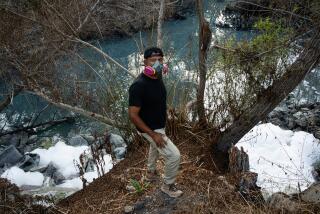TV REVIEW : Many Unanswered Questions in Bay Pollution Show : Environment: ‘It’s All of Us’ does a credible job exposing the dangers facing San Diego Bay, but a call for action is too understated. The show airs tonight.
- Share via
SAN DIEGO — There is much to applaud in “It’s All of Us--Marine Pollution in San Diego,” a half hour special airing today at 7:30 p.m. on KFMB-TV (Channel 8). With obvious sincerity, the show examines the state of San Diego Bay and the pollution problems that continually threaten the bay and the humans that use it.
If nothing else, the San Diego Oceans Foundation, the show’s producers, deserve credit for roping in the stately Walter Cronkite to host the program, and for wrangling a half-hour of commercial-free air time from Channel 8.
Without sensationalism or fire and brimstone speeches, the special chronicles the past, present and future of the bay.
In fact, it is balanced and understated to the point of being downright wimpy. It refuses to take a declarative stand. The message is so important that it is a frustrating program to watch.
Throughout, the show takes a chamber-of-commerce tone that seems intent on dispelling many of the horror stories about the bay, to present it to outsiders in the best possible light.
With fatherly Cronkite providing the narration and New Age music in the background, the special introduces viewers to the grand beauty of the bay, and, of course, emphasizes its economic importance to San Diego.
One of the the strongest sections of the special reviews the history of the bay, pointing out that raw sewage was dumped directly into the bay in the early 1900s and, at one point, “50 million gallons of sewage and waste flowed into the bay everyday.”
“Something had to be done, and San Diego rallied to do it,” Cronkite says.
But, in the 1970s, he says, new chemicals were found in the bay. The tone suggests that it wasn’t San Diego’s industrial interests that were continuing to ruin the bay, the new awareness came just from “sensitive tests” that found new elements.
The program touches on the bay’s “hot spots,” points of accumulated pollution, and many of the controversies that surround pollution issues.
In presenting the problems, the program provides a real public service. But it always stops short of touching the emotional nerve of the viewer, of really condemning the problems.
Late in the show, when discussing the runoff from neighborhood sidewalks and driveways that ends up in the bay, Cronkite asks, “How much of a danger do these chemical discharges represent to the bay?”
We don’t know, Uncle Walter. Please tell us, tell us!
He never does. Instead, Cronkite diplomatically says “sampling is being conducted” and “it is too early to know how much pollution they contribute, or to predict their future impact.”
Well, that may be the case, but there are plenty of experts who could confirm that such practices definitely are doing damage.
In general, the show leaves the disconcerting impression that it is primarily a commercial for additional research funding. It continually poses questions, rarely suggests any answers, and most of its conclusions revolve around the need for more studies.
At the same time, the audience could also conclude from the program that research has told us little, while concrete prevention measures, such as better boat-cleaning facilities, have done a tremendous amount of good.
The viewer is left to wonder if the call for funding is somehow related to the several research organizations represented on the Oceans Foundation.
Equally disconcerting is the fact that only slight mention is made of the role of corporations and big business in fouling the water, while several minutes are spent on boaters who dump their sewage into the bay. Although the callousness of boaters is sickening, and worth emphasizing, the viewer is left to wonder why the show isn’t equally aggressive about businesses that pollute the bay.
“It’s All of Us” is at its best when it emphasizes the theme of the title, giving viewers definite steps they can take to help the bay, such as recycling motor oil and not using pesticides.
And, if this program makes a few people think before they dump trash into the bay, it could be called a resounding success.
More to Read
The complete guide to home viewing
Get Screen Gab for everything about the TV shows and streaming movies everyone’s talking about.
You may occasionally receive promotional content from the Los Angeles Times.






